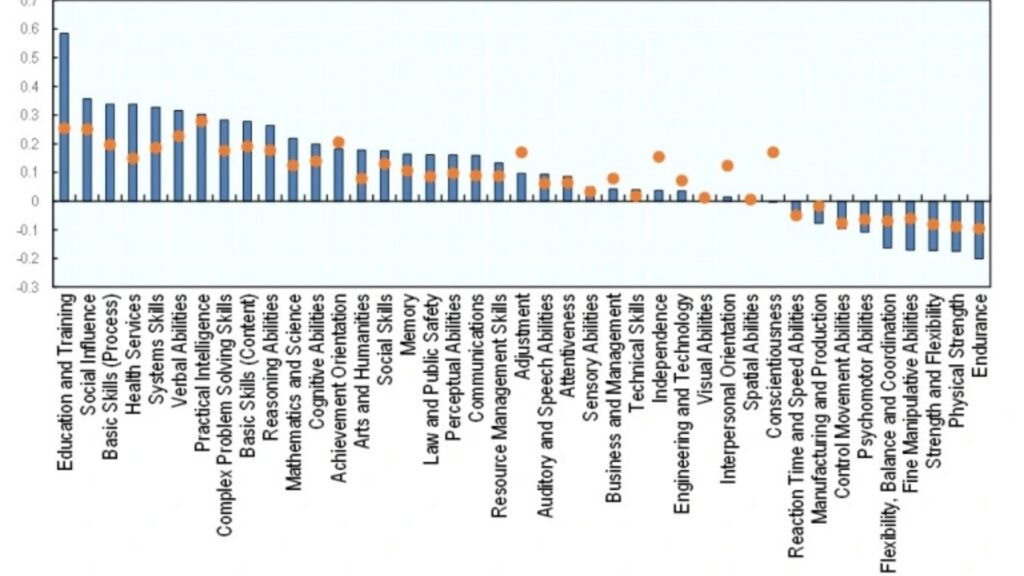The Organisation for Economic Cooperation and Development (OECD) shows major problems with adult education in Portugal in its new report. About 40% of Portuguese adults can only read simple texts and do basic maths. Portugal ranks second to last out of 31 countries ahead of only Chile.
Read More About: Alert Level Of Santa Bárbara Volcano On Terceira Island In Azores Drops
Portugal OECD Study For Adult Literacy And Numeracy

This is the first time Portugal took part in the OECD Adult Skills Inquiry. It looked at literacy, numeracy, and problem solving skills. The results show Portugal has a long way to go to improve adult skills. They carried this study in 2022 to 2023.
Portugal scored 235 points in literacy on a scale of zero to 500. This is well below the OECD average and only slightly higher than Chile.
The study found that 15% of Portuguese adults can only understand very short sentences. Another 27% can read short texts or lists. There is 42% of adults in total in Portugal have low literacy levels.
On the other hand, just 4% of adults showed strong reading skills. These people can understand long, detailed texts, identify hidden meanings, and use prior knowledge to solve complex tasks.
The numeracy results are also worrying. Four out of 10 Portuguese adults can only do simple calculations. They can handle whole numbers, decimals, and basic graphs but struggle with more advanced tasks like calculating proportions.
Only 7% of adults have advanced numeracy skills, such as understanding ratios and analyzing detailed statistics.
Weak Problem-Solving Skills
The study also looked at problem-solving, which is key in modern digital life. Portugal scored poorly here too. About 42% of adults can only solve simple problems with few steps and little information. Only 2% of Portuguese adults showed strong problem-solving abilities, such as adapting to changes and solving complex issues.
Portugal’s score in problem-solving was 233 points. This is higher than Italy, Lithuania, Poland, and Chile but lower than all other participating countries.
Impact Of Low Skills
The OECD report explains how low skills affect people’s lives. Adults with better literacy and numeracy skills are more likely to have jobs, earn higher wages, and feel happier. Those with low skills face greater risks of unemployment and financial problems.
In the report’s introduction OECD Director for Education Andreas Schleicher and OECD Director for Labour Stefano Scarpetta warn of the risks.
He said:
Despite significant efforts by governments and social partners to strengthen adult education and training systems, the inquiry reveals a very uneven skills landscape, with a growing number of people ill-prepared for the future
Portugal’s results are concerning but other countries also face challenges. Only Finland and Denmark have shown clear improvements in literacy over the past 10 years. Most countries have seen little change or even declines in skills.
The OECD study included 160,000 adults from 31 countries. It represents a population of 673 million people. Participants completed tasks that tested their ability to handle real-world situations using modern tools and data.
What Portugal Can Do
The report is a wake-up call for Portugal. The government, businesses, and communities will need action to solving these problems. The government should fund more programs to teach literacy, numeracy, and problem-solving to adults.
Evening classes and online courses can help working adults learn. Fixing adult education also means improving education for children. Schools need to give extra help to students who are struggling. Companies should offer training to improve employees skills.
Practical lessons on reading, maths, and technology can help workers and businesses. Community centers, libraries, and local groups can provide free workshops and learning materials. These programs can make education more accessible to everyone.
The government can also raise awareness about the importance of literacy and numeracy. Campaigns that show the benefits of learning, like better jobs and higher pay, can encourage more people to take part.
Portugal’s low scores in the OECD study show the need for urgent action. Improving adult skills will help people live better lives and strengthen the economy. The country must invest in education and training to close the skills gap.
Government and educators need to work together to make sure every adult has the chance to learn. Portugal can build a stronger future for all its citizens by improving literacy and numeracy
